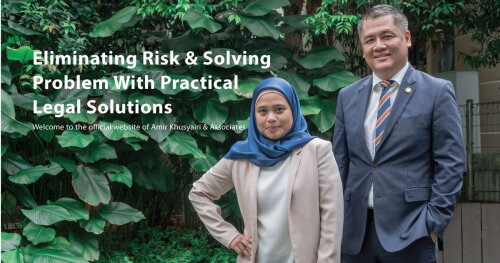Best Renewable & Alternative Energy Lawyers in Shah Alam
Share your needs with us, get contacted by law firms.
Free. Takes 2 min.
List of the best lawyers in Shah Alam, Malaysia
About Renewable & Alternative Energy Law in Shah Alam, Malaysia
Renewable and alternative energy refers to energy generated from resources that are naturally replenished, such as solar, wind, biomass, hydro, and geothermal energy. In Shah Alam, as in the rest of Malaysia, there is a growing movement towards sustainable energy solutions due to increasing energy demands and a government emphasis on reducing dependency on fossil fuels. This shift is influenced by national policies and local initiatives that promote the development and integration of clean energy sources into the community and commercial sectors. Understanding the legal framework that governs these energy sources is essential for anyone looking to navigate this evolving sector.
Why You May Need a Lawyer
Legal guidance can be critical in several situations related to renewable and alternative energy. If you are a property owner or business interested in installing solar panels or wind turbines, you may need to navigate regulatory approvals and licensing. Developers and investors often require help with contract negotiations, land use permissions, and power purchase agreements. Legal support is also necessary when applying for incentives, resolving disputes with contractors or utility companies, or ensuring compliance with environmental and safety regulations. A lawyer can help clarify your rights, obligations, and opportunities when engaging in renewable energy projects in Shah Alam.
Local Laws Overview
The legal landscape for renewable and alternative energy in Shah Alam is shaped by both national and local regulations. Key legislation includes the Renewable Energy Act 2011, which sets out the legal framework for feed-in tariffs, licensing, and the administration of energy generation from renewable sources. The Sustainable Energy Development Authority (SEDA) Malaysia plays a significant role in implementing these policies, including granting approvals and managing incentive programs. Local authorities in Shah Alam may have additional rules related to zoning, building codes, and environmental impact assessments that must be addressed when planning a project. Compliance with both national and local requirements is crucial to avoid delays or penalties.
Frequently Asked Questions
What types of renewable energy projects are common in Shah Alam?
Solar energy installations, particularly rooftop solar panels for homes and businesses, are becoming increasingly popular. Some projects also focus on biomass energy from agricultural waste or small-scale hydro systems.
Do I need government approval to install solar panels on my property?
Yes, certain approvals and notifications are usually required, especially for grid-connected systems. You may need to comply with local council regulations and obtain technical approvals from energy authorities.
Are there any financial incentives for renewable energy projects in Shah Alam?
Malaysia offers several incentives, such as the feed-in tariff program under SEDA and various tax benefits for renewable energy investments.
What permits are necessary for a commercial renewable energy project?
Permits can include planning permission from local councils, environmental impact assessments, and licenses from energy regulatory bodies based on the project size and type.
Can I sell excess electricity generated from my rooftop solar panels?
Yes. The Net Energy Metering (NEM) scheme allows for the sale of excess electricity to the national grid, subject to SEDA’s terms and conditions.
What legal issues might arise when entering a power purchase agreement?
Key issues include contract terms, pricing, duration, termination clauses, delivery obligations, and liability for non-performance. Legal review is highly recommended.
What are the environmental compliance requirements for energy projects?
Projects may need to comply with environmental impact assessments, waste management protocols, and emission standards as regulated by national and local agencies.
Does land zoning affect renewable energy installations?
Yes. Local zoning and land use regulations can restrict or influence where and how renewable energy systems can be installed.
Who regulates renewable and alternative energy in Shah Alam?
Regulation is primarily handled by the Sustainable Energy Development Authority (SEDA) and the Energy Commission of Malaysia, with local authorities managing building and planning approvals.
What can I do if my application for a renewable energy project is rejected?
You can appeal through the relevant government agency or seek legal representation to assess your options for review or alternative compliance solutions.
Additional Resources
- Sustainable Energy Development Authority (SEDA) Malaysia: Handles registration, incentives, and regulation of renewable energy projects. - Energy Commission of Malaysia (Suruhanjaya Tenaga): Oversees electricity supply and safety standards. - Ministry of Energy and Natural Resources: Develops national policies and programs for energy sustainability. - Shah Alam City Council (Majlis Bandaraya Shah Alam): Issues planning permissions and regulates building codes. - Malaysian Photovoltaic Industry Association: Provides industry news, standards, and networking for solar energy sector professionals. - Malaysian Green Technology and Climate Change Corporation (MGTC): Promotes sustainable practices and technology.
Next Steps
If you are considering a renewable or alternative energy project in Shah Alam or need legal guidance, start by gathering all necessary documents and identifying your project goals. Contact a local lawyer experienced in energy and environmental law to assess your case and advise you on the permissions, incentives, contracts, and compliance requirements involved. Schedule an initial consultation to better understand your rights and obligations. Be prepared to provide information about your property, project scope, and any correspondence with authorities or contractors. Legal expertise will help you navigate regulatory complexities and position your project for long-term success.
Lawzana helps you find the best lawyers and law firms in Shah Alam through a curated and pre-screened list of qualified legal professionals. Our platform offers rankings and detailed profiles of attorneys and law firms, allowing you to compare based on practice areas, including Renewable & Alternative Energy, experience, and client feedback.
Each profile includes a description of the firm's areas of practice, client reviews, team members and partners, year of establishment, spoken languages, office locations, contact information, social media presence, and any published articles or resources. Most firms on our platform speak English and are experienced in both local and international legal matters.
Get a quote from top-rated law firms in Shah Alam, Malaysia — quickly, securely, and without unnecessary hassle.
Disclaimer:
The information provided on this page is for general informational purposes only and does not constitute legal advice. While we strive to ensure the accuracy and relevance of the content, legal information may change over time, and interpretations of the law can vary. You should always consult with a qualified legal professional for advice specific to your situation.
We disclaim all liability for actions taken or not taken based on the content of this page. If you believe any information is incorrect or outdated, please contact us, and we will review and update it where appropriate.











